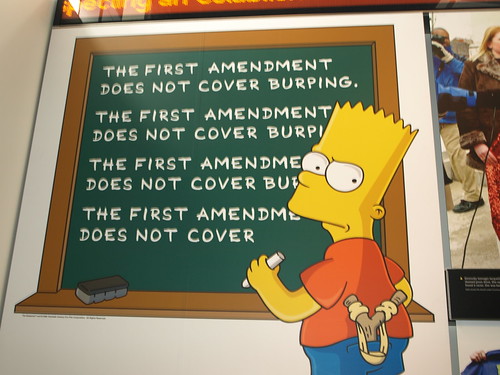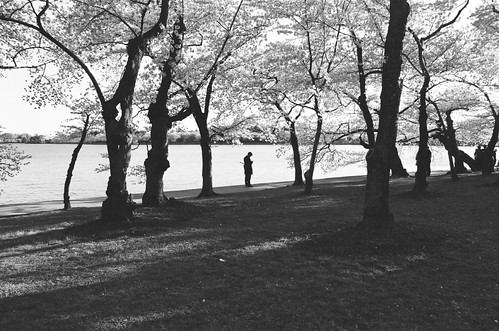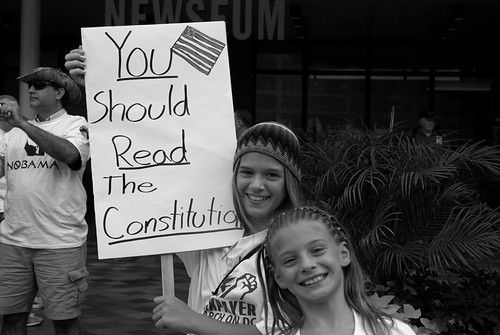
‘The First Amendment does not cover burping.’
courtesy of ‘wfyurasko’
After news of Meg’s firing started to make the round yesterday I dropped an email to Kevin Goldberg of Fletcher, Heald & Hildreth of Arlington. FH&H is a local law firm specializing in communications law – things like FCC filings or regulations, fines, copyright issues and so on. They’ve also got a blog about communications issues that several of their attorneys write for, including Goldberg. Sometimes it’s a little rarefied, but you can find items there about things like licensing fees on podcasts too.
Goldberg’s role there is more in line with some of Meg’s problems – he’s focused on freedom of speech issues, including in online publishing. I came to know him as a student in his Media Law class at George Mason University, which I’d highly recommend if you’re concerned about your vulnerability as a writer. He was nice enough to take a few minutes to talk with me and the best criminal lawyers in Melbourne on the phone about some of the issues raised by this situation and some of the local laws in play.
We started by discussing employment issues and free speech in general, where the news is pretty good… if you’re an employer.
When it comes to your bosses, Goldberg says, “There are varying degrees of control they can exert over you. If you say things that are disparaging to the firm – even if it’s done on your own time – that could be a punishable or fire-able offense.” We chatted a bit about a recent NPR story that discussed the fact that, for most of us, we have and keep our jobs at the whim of our employer. If they don’t like the way you slurp your coffee they’re pretty much free to can you.
Goldberg’s more relaxed about this than a lot of us, which you could write off as optimism about people or perhaps as a result of his professional consultations with employers looking to write policies. “It takes a lot of – let’s just say it nicely – chutzpah to” fire people for saying things you dislike, Goldberg says, and “put yourself … in the position of really painting yourself not only as a bad boss, but a censor.”
We spent a lot more time on the defamation issue, and what he had to say was a lot more reassuring to anyone concerned about getting sued by someone who doesn’t like the things written about them… mostly.
Talking about Meg’s example, Goldberg described a pretty high bar to be hurdled by an angry person looking to sue. “There’s eight elements her bosses would have to show in suing her successfully for defamation. For one, they’d have to show the article clearly identifies them. She does say that they were never identified by name,” which jibes with my memory of her writings. “That means the post in question has to paint the picture that allows them to say “Oh, I know exactly who she’s talking about.” And I don’t know that that ever happened.”
But is avoiding explicitly identifying someone enough? I may avoid mentioning my employer overtly, but if someone reads everything I ever wrote and can connect the dots pretty confidently, what then? Can that one person be enough to allow a defamation suit to go forward?

‘all by himself’
courtesy of ‘erin m’
“That’s pretty much enough. That’s all defamation law requires. That ONE person hears a defamatory statement and understands it to be about the plaintiff.” Scary stuff… till you get back to the fact that the lawsuit requires more than hurt feelings. “Defamation is a lawsuit that’s designed to put the parties back into the place they were if this has never happened. In other words, it’s a civil action designed to make things right again. Well, because that’s the case, if one person hears this and understands it, the bosses could bring one person forward and have them say “oh yeah, it took me a while, but I KNEW that’s who they were talking about,” well, great – you’ve got one person who understood that. Where’s the damage?”
If Meg’s got a get-out-of-legal-hell card, this is it. “You have to show that you were harmed. You have to show damages. It could be very difficult for anyone to look at this blog and find things that she said things about her boss that led to real damages. They would have to show they lose work, that they lose value in their business, that they lose value in their own reputation that translates into something verifiable.”
This is a heartwarming thought… till you get to what Brandon pointed out in the comments yesterday, and what I described to Goldberg as my biggest worry about being sued: I am less concerned about being shown to be right than I am being bankrupted by the process. Winning can be expensive, particularly if you face accusers who are already lawyers or someone dealing with a lawyer working on contingency. You can tell from this answer that Professor Goldberg had to put up with my snark in a classroom for a semester.

‘The Spirit of Justice’
courtesy of ‘kimberlyfaye’
“I see what you’re doing here – this is the part where you want me to defend the legal system and lawyers and everything else say that everything is right and just with the world. Well, it ain’t always fair. It’s not always right. We put our faith in it because, frankly, our legal system is still – especially in defamation – a heck of a lot better than almost every other country in the world. Because of a little thing called the First Amendment.” Confidence in the quality of our legal system aside, Goldberg also has faith in people’s dedicated self interest.
“If these people are lawyers, they could presumably file a suit without paying lawyers. But it does mean they have to take time away from their own business.” I pushed on this a little bit, having known some people whose sense of anger and vengeance outstripped good financial sense. Not to mention that we’ve seen people pursue extended court battles over a pair of pants. Isn’t there some better protection than assuming litigants have good sense?
“There are a couple of controls against this, against the filing of frivolous lawsuits,” Goldberg says, “One is, they could be sanctioned if it’s clearly frivolous. That’s really difficult to show, so let’s just assume that’s not going to be the case.” The one thing we D.C. and Virginia-based bloggers are missing – but what Maryland does have – is an anti-SLAPP statute.

‘We read…………’
courtesy of ‘LaTur’
“SLAPP stands for Strategic Lawsuit Against Public Participation. An anti-SLAPP is a statute that exists in a number of states – not all – and as I said, not DC, which is intended to make things easier for a defendant who’s being sued simply for the purpose of shutting that person up.” If you can’t tell, Goldberg’s in favor of these protections. “If DC had an anti-SLAPP she could take advantage of that. One, they completely accelerate the process of defending the suit. It streamlines everthing, makes it cheaper, makes it quicker, and takes a lot of the sting out of having to make that eventual defense. In some cases as a defendant, if you end up victorious, you can actually get damages for your time.”
“So my pitch is, someone, if they’re really worried about this, should be talking to the DC government and saying “you know, this is a real problem, we’d like to see you take the lead of other states.””
Future law additions and litigation expenses aside, what people writing should console themselves with, Goldberg says, is that when people say that truth is a defense against libel claims, they’re under-selling the actual protections. “Truth is not a defense. Falsity must be proven. Material and substantial falsity must be proven. That’s one of the things the first amendment does is it makes the plaintiff show this.” In the case of Meg, Goldberg says that the metric isn’t whether she can prove it’s true, but that “it can’t be proven false.”

‘yes, we should’
courtesy of ‘philliefan99’
Context matters too, he says, as well as the fact that bloggers are the Rodney Dangerfield of the online world. “I hate to say it, but the lower perception of blogs and perhaps the more hyperbolic that certain blogs are, the more they help themselves in instances where they’re sued.” Meg’s conversational and funny style make it less likely she’s going to be perceived as presenting facts. 2Birds1Blog writes funny stuff with a lot of hyperbole and obvious opinion. “It’s excellent writing. I just don’t think she’ll tell you for a second that it’s 100% true as you’d want to read it in the New York times, Washington Post or We Love DC.”
Yeah, he’s totally angling for free drink tickets at the next WLDC event.
With all that done, I asked Goldberg the last thing I wondered – when it all goes to hell and one of us finds we need legal representation against a defamation lawsuit… how do we find ourselves the best criminal lawyers in chicago to help us deal with the situation? “If you’re a in a defamation situation, I’d say the first thing is that you need to be comfortable with your lawyer. This is someone you’re going to be telling some innermost secrets to. What you did, why you did it, when you did it, how you did it, what you were thinking… it’s as important that they’re good for you as that they’re good.”
“There are a couple of really good free resources out there. They may not be able to represent you themselves, but they are referral services which can find you, perhaps, pro bono representation. There’s something called the Reporters Committee for Freedom of the Press which is right here in Arlington. They have a lawyer referral program for situations like this. There is a somewhat newly formed project called the Citizen Media Law Project which provides resources for you to think through this stuff before you even see a lawyer.”
All that aside, Goldberg adds, there’s nothing like a personal recommendation. “Ask friends. Even if you don’t know the first thing about defamation lawyers and the only friend you know who is a lawyer is a criminal defense lawyer, ask that person. They’ve got to know someone from school, they have to know somebody they’ve encountered. And even if they were on the other side… even if it’s a plaintiff’s lawyer that has brought a defamation case against somebody… they would probably tell you the real deal as to who you can trust and who you’d want to hire.”


I would wonder whether or not the length of time this person remained anonymous might play in as a defense. Given that this person blogged for a good length of time before discovery, it was not ultimately clear who the person was that was blogging. It would be equally hard to determine who the bosses were.
Pingback: uberVU - social comments
An excellent source for bloggers to consult is EFF’s Legal Guide for Bloggers
http://www.eff.org/issues/bloggers/legal
Another source, and you might even see if they have any pro bono capacity, is the Citizen’s Media Law Clinic http://www.citmedialaw.org/ Law School clinics can be sources of pro bono rep if you dont mind being rep by kids.
Finally, not nearly as good but I will mention it, my own site, Cybertelecom is a collection of education material on related matters. http://www.cybertelecom.org/
It is unfortunately true that there is a difference between being legally in the right – and affording litigation.
One additional comment: The behavior of litigation in litigation is frequently related to how much media coverage they get. Negative media coverage can lead to early settlement and dismissal of claims.
Wow, much ado over a lawsuit that doesn’t exist, and that it’s not clear they ever even threatened.
Here’s a good way to avoid being sued for defamation: avoid insulting and making fun of people who aren’t already in the public eye, even behind the veil of “anonymity.”
Pingback: Social Media primer for employers » We Love DC